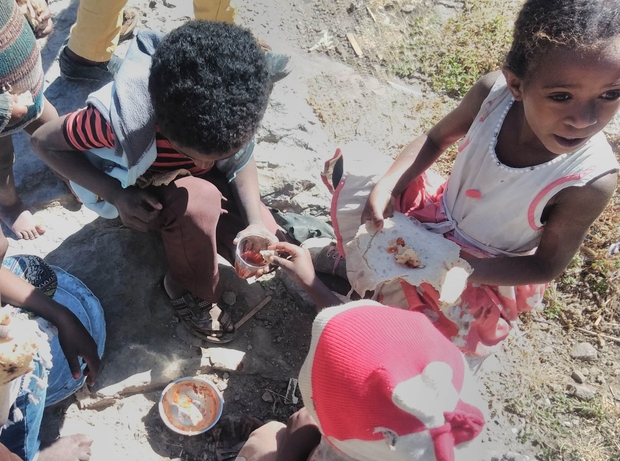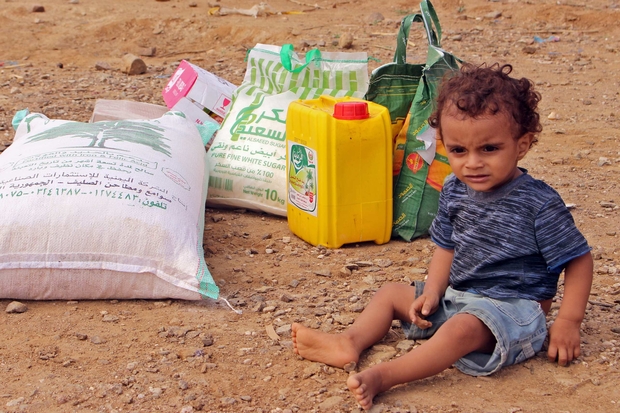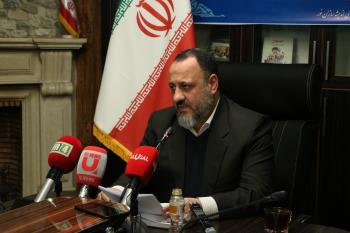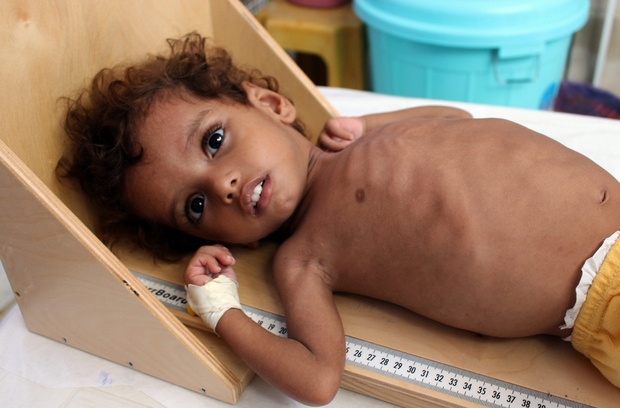Bashir al-Sofi remembers making a living as a construction worker. That was before the war.
Work is scarce today, and the 48-year-old father of seven now struggles to feed his family in his village south of the city of Taiz. His children don’t get three meals a day and they haven’t eaten meat or fruit in a long time. Such staples have now become a luxury.
“One of my children suffers from malnutrition because he was born at the beginning of the war and I couldn't provide him with milk and proper food," Sofi tells Middle East Eye.
With 500 grammes of rice, 1kg of flour, and the occasional 500 grammes of fava beans split between nine people, each member of the Sofi family eats an estimated 500 calories a day - less than a quarter of what is needed for a healthy balanced diet
Most days, the family subsists on bread and tea for breakfast, rice or aseed - a traditional Yemeni dish made with wheat, salt and water - for lunch, and bread and tea again for dinner.
With approximately 500 grammes of rice, 1kg of flour, and the occasional 500 grammes of fava beans split between nine people, each member of the Sofi family eats an estimated 500 calories a day - less than a quarter of what is needed for a healthy balanced diet.
Photographs of skeletal Yemeni children have shocked the world into paying attention to the ever-worsening humanitarian crisis in the war-torn country, where 18 million of the country’s 28 million inhabitants are food insecure and eight million rely completely on external assistance, according to the UN's World Food Programme.
According to Save the Children, more than 50,000 Yemeni children died of starvation and disease in 2017 alone - roughly as many as the estimated number of casualties of armed violence in the country - 56,000 - since January 2016.
The reasons behind the slow starvation of Yemen are complex, but for many in the country, the consequences are deadly.
Agriculture targeted
After nearly four years of war, the violence has damaged the country’s food supply.
The battle for the coastal city of Hodeidah, which has recently escalated after months of stalemate, has long been viewed as crucial due to the city’s strategic port, which receives an estimated three-quarters of Yemen’s humanitarian and commercial cargo.
Vital food infrastructure in areas held by Houthi rebels has been targeted by the Saudi-led coalition since the early stages of the war, London School of Economics professor Martha Mundy highlighted last year.
But just as importantly, Mundy noted, “agricultural land was the target most frequently hit” by coalition air strikes in almost every governorate in Yemen, despite representing only three percent of the country’s lands.

Children in the city of Taiz eat a breakfast consisting of bread, some bell peppers, and tea (MEE)
“In short to target agriculture requires a certain aim,” she wrote, adding that “placing the rural damage alongside the targeting of food processing, storage and transport in urban areas, we find strong evidence that Coalition strategy has aimed to destroy food production in the areas" controlled by the Houthis and other pro-Houthi groups.
The problem is not a shortage of food in markets but that we do not have money to buy food that is now expensive
- Bashir al-Sofi, Yemeni father of seven
While agriculture and food distribution suffer from the war, food remains available in markets across the country - but few can afford it.
"All kinds of food and other items are available in the market. The problem is not a shortage of food in markets but that we do not have money to buy food that is now expensive," Sofi said.
The collapse of the Yemeni currency, which went from 215 rials to the dollar in 2015 to 750 rials for one dollar in 2018, has been blamed for the sharp rise in the prices of everyday necessities.
A 50kg bag of wheat that used to cost some 4,500 Yemeni rials in 2015 is now sold for 13,000 rials, and many other commodities have witnessed similar price increases.
Yemen was already the poorest country in the Arab world before the war, but the United Nations warned last month that it could face the "worst famine in the world in 100 years" if the fighting goes on.
While the UN speaks of impending famine, for many Yemenis, it is already there, with non-governmental organisations standing as the only barrier between them and starvation. It is a weak barrier.
NGOs powerless to stop the tide of hunger
Like many other Yemenis, Sofi, the father of seven, gets up early every morning to try to register with several organisations in Taiz to receive food aid.
"Most needy people depend on organisations to provide them with food as the war has deprived us of our sources of income," he explained. "Each organisation provides us with only a small quantity of food and this is not enough. Moreover, this aid does not last long because there are people in need of assistance in different areas."
Ibrahim Haroun, aged 36, is not as lucky. Since he and his family fled Hodeidah for Taiz - over 200 km away - in July, he says he has not received aid.
"The battles in Hodeidah forced me to flee my house towards Taiz, where I know some friends, but here I have not been able to get food from organisations for my four children," Haroun told MEE.
While some organisations registered Haroun and his family on their waiting lists, due to the large number of needy people, Haroun has been told the earliest he can expect to receive aid is in early 2019.
“I hope I will receive food soon so my children can get enough meals every day,” he said. “Nowadays they sometimes only have two meals per day."
More than 8,300 registered civil society organisations and 102 international NGOs work in Yemen, in addition to an estimated 3,000 unregistered civil society groups. Yet despite their large number, they have failed to stop the relentless creep of starvation in the country.
"I know those organisations do their best to help us. I thank them for their efforts to help and I hope they could help more beneficiaries, because the number of needy people is increasing every day," Sofi said.
"Most Yemenis are jobless, and they receive food from organisations, so this puts pressure on those organisations," Haroun added.

While thousands of organisations supposedly provide food aid in the country, they remain unable to provide for all needy Yemenis (AFP)
Yasmin Thabet, the founder of a civil society organisation in Taiz called "We Love You", said that while local and international organisations work side by side to provide aid, local organisations often struggle with financing.
"We depend on generous people and expatriates to support our foundation," Thabet explained.
"However, the real problem is that every day there are more people who need our help, and we cannot help them all because we do not have enough money."
Thabet added that some civil society organisations rely on international NGOs to provide them with food, but that even the foreign organisations can't supply enough to fulfil the demand.
Meanwhile, a source from the Ministry of Social Affairs in Sanaa said most civil society organisations "don't play any role in stopping the coming famine", either because their work is focused on raising awareness, or they simply don't have the budget for it.
The ministry source, who requested anonymity, also said a number of local organisations were embezzling donations. While not naming any organisations, the source said the ministry revoked some groups' licences, but that many continued their work, even without a licence.
"Corruption is everywhere,” the source said. "I call on all the civil society organisations to remember that they are collecting money for the sake of helping needy people and not for themselves.”
The war is the reason
The UN humanitarian coordinator for Yemen, Lise Grande, said that as many as 13 million civilians could be at risk of dying of starvation in the country if the Saudi-led military coalition backing exiled President Abd Rabbuh Mansour Hadi does not halt its campaign in Yemen.
Many Yemenis, such as Sofi, hold out hope that an end to the war will allow them to provide for their families independently once more.
"It is the war that deprived us of work and turned us into dependents on organisations, so I hope the war will end so I can resume my work as before," he said.
Thabet agreed. "The ongoing war is the main reason behind the coming famine in Yemen,” she said.
The path to solving hunger starts with peace
- Wilf Dinnick, Mercy Corps communications manager
“The only solution is peace. Without an end to the war, organisations cannot stop famine - and instead many diseases may appear in society."
Wilf Dinnick, the Middle East communications and media manager for Mercy Corps, said that since 2014 his organisation had screened nearly 18,000 Yemeni children under the age of five for acute malnutrition, including 5,000 who were treated for severe acute malnutrition.
For Dinnick, the debate on whether a famine is imminent or already occurring is beside the point.
"The important point here isn't whether there's technically famine or not, because there are millions of people in desperate need of assistance," he told MEE.
While noting that “many areas [of Yemen] were emergencies before the conflict," Dinnick condemned the war for its devastating impact on the humanitarian situation.
“Conflict and famine are intertwined. It displaces populations, it disrupts agricultural and food markets," Dinnick said. “The path to solving hunger starts with peace. It's the first way to help those who need food and water."



























